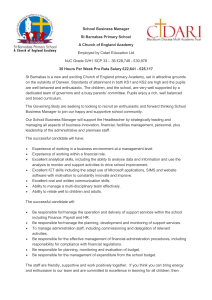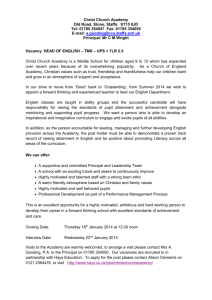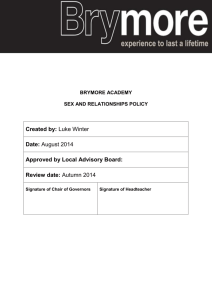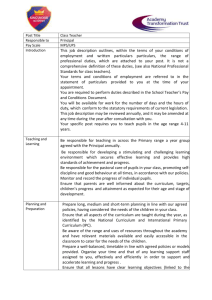Sex and Relationship Policy
advertisement
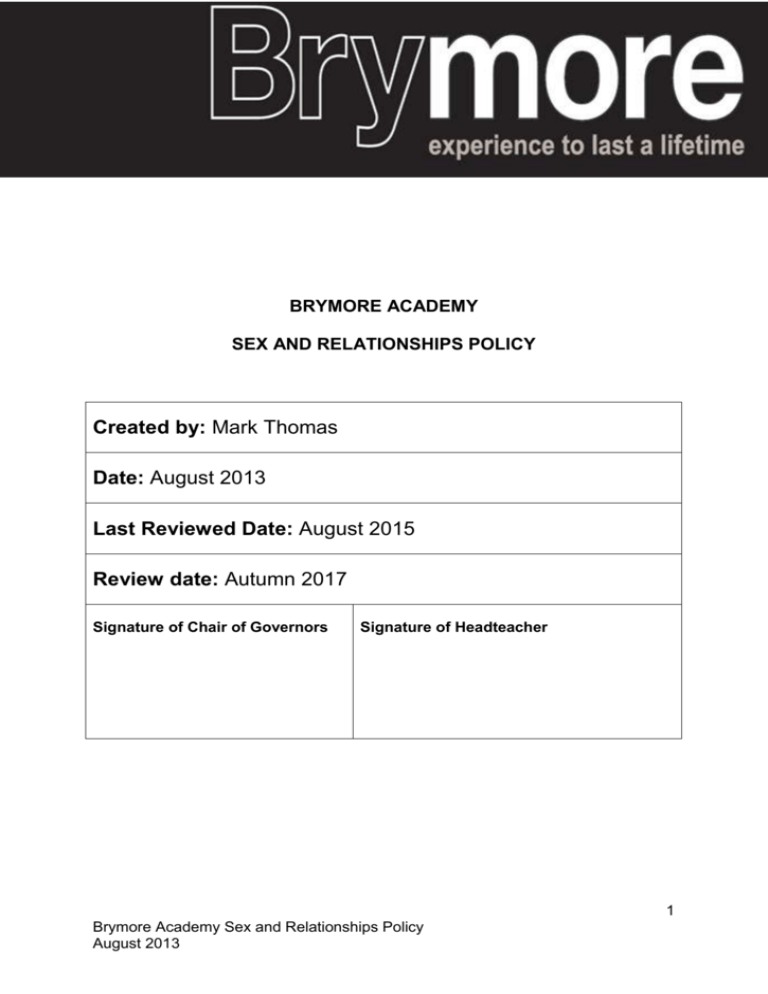
BRYMORE ACADEMY SEX AND RELATIONSHIPS POLICY Created by: Mark Thomas Date: August 2013 Last Reviewed Date: August 2015 Review date: Autumn 2017 Signature of Chair of Governors Signature of Headteacher 1 Brymore Academy Sex and Relationships Policy August 2013 AIMS This policy is a ‘stand alone’ policy that comes under the umbrella of Personal, Social, Health and Religious Education (PSHRE) in the Academy. At Brymore, we aim to provide our pupils with an age appropriate Sex and Relationship Education programme that is tailored to their physical and emotional maturity. It should enable them to make positive choices about their sexual and emotional health, both now and in the future. We seek to achieve this aim by having three main elements to our programme: Attitudes and values Learning to care about other people and being sensitive towards their needs and views; Learning the importance of values, and individual conscience and moral considerations; Accepting the differences between people and learning not to exploit them; Learning the value of family life, marriage, and the importance of stable, loving and caring relationships for the nurture of children; Learning the importance and responsibilities of the family unit for all its members; Learning to respect oneself and others and being honest, loyal and trustworthy in relationships; Learning to take responsibility for one’s actions in all situations; Exploring, considering and understanding moral dilemmas; and developing critical thinking as part of decision making. Personal and social skills Learning to manage emotions and relationships confidently and sensitively; Developing self-respect and empathy for others; Learning to make choices based on an understanding of difference and with an absence of prejudice; Learning how to make well informed and responsible decisions about their lives and developing an appreciation of the consequences of the choices made; Managing conflict; Learning how to recognise and avoid exploitation and abuse. Knowledge and understanding Learning and understanding physical development at appropriate stages; Understanding human sexuality, reproduction, sexual health, emotions and relationships; Learning about contraception and the range of local and national sexual health advice, contraception and support services; Learning the reasons for delaying sexual activity and the benefits to be gained from such delay; The avoidance of unplanned pregnancy; We believe that Sex and Relationship Education will be achieved by providing an environment and atmosphere where pupils feel safe, relaxed, not intimidated, but focussed and where they have confidence and trust in the knowledge, ability and skills of their teachers. 2 Brymore Academy Sex and Relationships Policy August 2013 RATIONALE At Brymore, we believe that effective Sex and Relationships Education is essential if our pupils, as they grow, are to make responsible and well informed decisions about their lives. It contributes to promoting the spiritual, moral, social, cultural, emotional, mental and physical development of our pupils, preparing them for the opportunities, responsibilities and experiences of adult life. We believe that Sex and Relationship Education should not be delivered in isolation, but be firmly rooted in our Personal, Social and Health Education and Citizenship programme, supplemented by other subjects and our taught curriculum. DEFINITION OF SEX AND RELATIONSHIP EDUCATION Sex and Relationship Education is lifelong learning about physical, moral and emotional development. It is about respect, love and care and the benefits of making and maintaining a stable marriage or relationship. We recognise that to be human is to experience sexual feelings, seek connections with other people and develop relationships, which may be physical or non-physical. Our teaching of sex and relationship education is applicable to all sexual orientations and will include teaching of sex, sexuality and sexual health. Sex and Relationship Education seeks to enable young people to feel positive about themselves, manage relationships and access the infrastructure of support available. MORAL FRAMEWORK Pupils will be taught Sex and Relationship Education within a framework which models and encourages the following values: Being honest with themselves and others Developing a critical awareness of themselves and others Learning to show tolerance, understanding, respect and care for others Acknowledging the rights, duties and responsibilities involved in sexual relationships Developing an awareness and belief in one’s own identity Having a positive attitude towards the value of stable relationships for the upbringing of children Acknowledging and understanding diversity with regard to religion, culture and sexual orientation. Having self-discipline regarding their sexuality. WORKING WITH PARENTS Brymore is committed to working in close partnership with parents and carers who are the key people in teaching their children about sex and relationships. Parents/carers are welcome to discuss the Academy’s Sex and Relationship Education programme with the Assistant Headteacher (Student Welfare) at any time. A parent or carer, who is concerned about any element of this policy, or is unhappy about their child’s participation, should discuss their feelings with the Headteacher. Parents have the right to withdraw their children from all or part of those aspects of the Sex and Relationship Education Programme which are NOT part of the statutory National Curriculum Science Orders. If requested, alternative arrangements will be made for individual pupils, but it is hoped that this will not be necessary. If so, parents should consult with the Headteacher to discuss appropriate arrangements. 3 Brymore Academy Sex and Relationships Policy August 2013 CONTENT AND ORGANISATION The organisation of Sex and Relationship Education is no different from other curriculum areas. It is delivered through planned programmes predominantly within Science, RE and PSHRE. In addition, contributions may be made through other subjects. Occasionally, issues about Sex and Relationship Education may arise spontaneously in other lessons (eg while studying English Literature) where it is not the main focus of the lesson. This is not considered to be part of the planned Sex and Relationship Education programme and parents or carers cannot withdraw pupils in these circumstances. Visitors may be used to support the delivery of the programme and will always be fully briefed on their contribution to the programme and will be given a copy of the current policy beforehand. Aspects of Sex and Relationship Education are encompassed within the ethos of the Academy and may be delivered through: PSHE lessons Core and foundation subjects Assembly time Focus days Theatre in Education visits Project/theme lessons The Sex and Relationship Education programme will be delivered by: Specific teachers Other specified visitor/s or agency. A range of teaching approaches will be used. The overview and co-ordination of the taught curriculum is the responsibility of the Assistant Head (Student Welfare). The Senior Leadership Team will identify staff who have the appropriate skills, qualities and knowledge to teach the more sensitive and contentious aspect of Sex and Relationship Education. Continuous professional development and training will be provided to ensure a high level of expertise for teachers involved in delivering the Sex and Relationship Education programme in the Academy. EQUAL OPPORTUNITIES Sex and Relationship Education is inclusive of all students; they have an equal entitlement to good quality Sex and Relationship Education. The programme will be delivered in line with the Academy’s Equal Opportunities policy within an atmosphere of mutual respect. The whole Academy community will support an approach which ensures that no individual will be discriminated against on grounds of gender, race, disability, religion or sexual orientation. Resources selected to support the programme will be free from cultural bias wherever possible and will avoid gender, race, disability or sexual orientation stereotyping. The programme will be sensitive to the needs of pupils in the Academy. The Academy will not discriminate against any member of the Academy community who is infected or affected by HIV. SPECIFIC ISSUES Personal Beliefs The personal beliefs and attitudes of teachers will not influence their teaching of Sex and Relationships Education. 4 Brymore Academy Sex and Relationships Policy August 2013 Language and Ground Rules in Lessons All staff teaching Sex and Relationship Education will set ground rules in their classes. For example: 1) No one (teacher or pupil) will have to answer a personal question. 2) No one will be forced to take part in a discussion. 3) The only language used will be easily understood and acceptable to everyone in the class. 4) Only correct names for body parts will be used. 5) Meanings of words will be explained in a sensible and factual way. Students will be involved in the negotiation/setting of these rules. Distancing techniques will also help to avoid the inappropriate disclosure of information. These may include case studies, role play and speaking in the third person. Dealing with difficult questions We have a variety of strategies for dealing with difficult questions. For example: If a question is too explicit or is inappropriate, the teacher will attend to it later on, on an individual basis and a decision will be taken whether or not to inform the child’s parents/carers; If a child makes a disclosure that causes the teacher concern then they should follow the academy’s child protection procedures Contraception Trained staff are able to give pupils full information about different types of contraception, including emergency contraception, and their effectiveness and appropriateness. Individual advice cannot be given to pupils. Trained staff can, however, give both individual pupils and groups of pupils additional information and guidance on where they can obtain confidential advice, counselling and, where necessary, treatment. Abortion Pupils will consider the moral and personal dilemmas involved in abortion. Awareness of Testicular Cancer It is important that students are made aware of the benefit of self-examination in the early detection of testicular cancer. Safer Sex, HIV/AIDS and Sexually Transmitted Infections (STI’s) STI’s are major causes of ill health which can have long-term physical and psychological health consequences. Young people may become complacent. Therefore, teaching includes: Helping students to clarify their knowledge of HIV/AIDS and STI’s Teaching them assertiveness skills for negotiating relationships. Enabling them to become effective users of services that offer advice on prevention and treatment of STIs. Teaching about Gay, Lesbian and Bisexual Relationships The diversity of sexual orientation found within society may also be reflected in the Academy community. Students will need to be given information regarding access to relevant support 5 Brymore Academy Sex and Relationships Policy August 2013 agencies. The Academy will seek to ensure that Sex and Relationship Education is relevant and positive for all students, and that teaching about sexuality is undertaken by teachers who are trained and comfortable with such issues. Confidentiality Teachers cannot offer or guarantee absolute confidentiality. It is only in the most exceptional circumstances that Academys should be in the position of having to handle information without parental knowledge. The Academy will be acting in loco parentis. Whenever a pupil makes a disclosure, they will be persuaded to talk to their parents or carers. Child Protection issues will be addressed if necessary; but if not necessary, the wishes of the pupil will be taken into account. Information about local advice and support is available to pupils. Different codes of conduct apply to different professionals working in our Academy. 1) Counselling Service The Academy provides a counselling service that is available to all students. The Assistant Head (Student welfare) refers students to the counsellors where appropriate. Other students can be referred to professionals working with the Academy as part of the extended service. Staff are informed that the counselling is confidential between the counsellor and the student. The counsellor works to national professional guidelines on confidentiality and LEA child protection procedures. Parents/carers are informed of the counselling service. Students and parents/carers will be informed of the child protection limit to confidentiality. 2) Doctors, Contraceptive and Sexual Health Service Clinics. Students will be made aware of the confidential support available from doctors and local clinics (including the child protection qualification). 3) Academy Staff Staff may encounter the situation where it appears that a student under 16 is about to disclose that they are in or are about to begin a relationship involving sexual intercourse or that they are seeking contraceptive advice. At this point staff should indicate that they wish to help the student in their situation but that they cannot offer or guarantee absolute confidentiality. Staff must follow child protection guidelines. Members of staff who are not health care professionals must not give individual contraceptive advice. It is also appropriate to remind students of information about access to support that is available in the Academy or has been outlined in lessons. These actions (suggesting that students see specific members of staff or reminding them of information) do not involve a requirement to inform parents/carers. Similarly, as students under 16 are able to access doctors or clinics for contraceptive advice, where a member of staff advises students to seek medical advice at a GP’s surgery or clinic there is not a requirement to inform parents/carers. However students will always be encouraged to talk to their parent/carers and will be supported in so doing. In each circumstance the best interests of the young person will be seen as paramount. 4) Confidentiality in Lessons Staff teaching Sex and Relationship Education have a duty of care and may wish to make a ground rule that opinions and ideas expressed in discussion should not be repeated outside the lesson. Again it must be stressed that no absolute confidentiality can be promised. Clearly a lesson situation is also a significantly different context to a conversation with an individual. Students should be reminded of this difference. Through distancing techniques and ground rules students should understand that lessons are not an appropriate place to disclose personal information. 6 Brymore Academy Sex and Relationships Policy August 2013 7 Brymore Academy Sex and Relationships Policy August 2013


